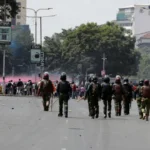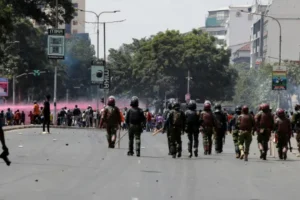Noteworthy progress was marked in Libya’s journey towards national reconciliation, as the third regular meeting of the Preparatory Committee concluded in Sabha. The agenda of the meeting centred around key decisions for the upcoming National Reconciliation Conference. Chaired by Deputy Head of the Presidential Council and the official in charge of the reconciliation file, Abdullah al-Lafi, the meeting saw participation from representatives of all significant factions involved in the political process.
Unanimous Agreement and Venue Selection
The meeting, which also included the presence of Congolese Minister of Foreign Affairs and Francophonie Jean Claude Gakosso, and African Union National Reconciliation Advisor Mohamed Hassan El-Labad, reviewed the minutes of previous consultative meetings. A unanimous agreement was reached, furthering the cause of unity and cooperation in the strife-torn nation. The city of Sirte, known for its historical significance and central location, was chosen as the venue for the comprehensive National Reconciliation Conference, scheduled to take place on April 28th of the following year.
Establishing the Preparatory Committee
The Sabha meeting also saw the establishment of a mechanism for creating the Preparatory Committee for the conference. The competencies and internal regulations of this committee were defined, ensuring its efficiency and effectiveness in organizing the upcoming event. The next preparatory meeting of the committee was decided to be held in the city of Zuwara, marking the end of the current month.
Libya’s Struggle with Disarmament and Political Settlements
However, the road to reconciliation in Libya is not without its challenges. Discussions of disarmament, demobilization, and reintegration in the nation are often seen as premature. Yet, there is scope for planning, contingent on local contexts. For long, Libya’s political settlements have relied on elite deals for stability. Unfortunately, this has resulted in power-sharing systems that foster corruption and lead to disastrous governance failings. The upcoming National Reconciliation Conference aims to rectify these issues, marking a new chapter in Libya’s political landscape.
Source: Bnnbreaking











